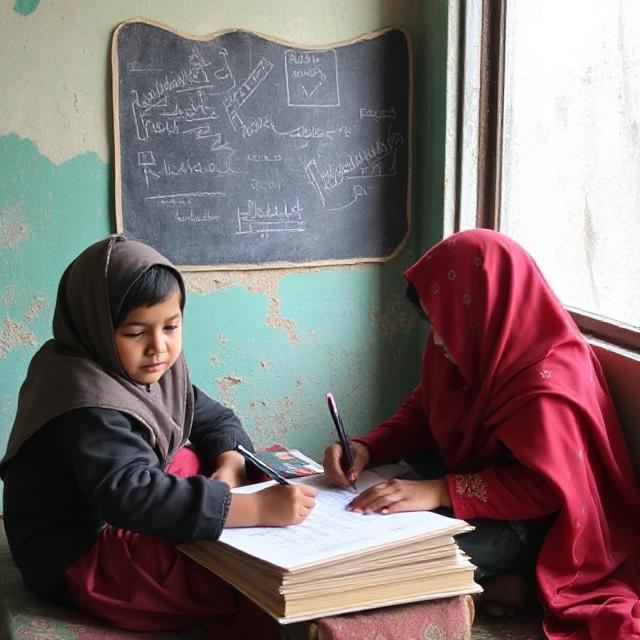In Kashmir, education is becoming a privilege rather than a right. The soaring costs of textbooks and stationery are forcing parents to make tough choices. Can the system be reformed before it’s too late?
By Rayees Masroor
Education serves as the cornerstone of societal progress and individual empowerment, laying the foundation for a brighter future. However, in recent years, a troubling trend has emerged in the region of Jammu and Kashmir, particularly in the Kashmir Valley. The growing reliance on expensive textbooks and stationery has placed an undue financial burden on parents and guardians. This issue not only exacerbates socio-economic disparities but also contradicts constitutional and legal provisions designed to ensure equitable, high-quality education for all children, regardless of their financial background. The Constitution of India enshrines the right to education through Article 21A, mandating free and compulsory education for children aged 6 to 14 years. This fundamental right is further reinforced by the Right to Education (RTE) Act of 2009, which seeks to ensure that every child has access to free and equitable quality education without discrimination. Moreover, Article 39(f) underscores the importance of providing children with opportunities and facilities to develop in a healthy manner, under conditions of freedom and dignity. However, the commercialization of education, driven by exorbitantly priced textbooks and learning materials, undermines these constitutional principles, making education an increasingly expensive privilege rather than a fundamental right.
In a region like Kashmir, where socio-economic challenges already hinder access to quality education, the role of the administration becomes crucial in ensuring the strict implementation of RTE provisions. One of the key issues at hand is the lack of regulatory mechanisms to monitor and control the rising cost of textbooks. Many private schools compel parents to purchase expensive books from specific publishers, often at prices that are unaffordable for middle and lower-income families. This practice not only violates the ethos of the RTE Act but also contradicts the National Education Policy (NEP) 2020, which has been implemented in Jammu and Kashmir. The NEP 2020 emphasizes reducing the curriculum load and fostering conceptual understanding rather than rote memorization. It advocates for affordable and accessible learning resources, including the development of high-quality textbooks in multiple languages at low costs. Additionally, it encourages the use of digital and open educational resources (OERs) at higher grades to ease the financial burden on parents. The focus should be on prioritizing experiential and skill-based learning over excessive dependence on textbooks. However, the ground reality in Jammu and Kashmir starkly contrasts with these ideals.
Education in Kashmir has increasingly become a commercial enterprise, with many private schools mandating the purchase of overpriced books that are often beyond the comprehension level of young learners. This trend disproportionately affects middle and lower-income families, forcing parents to make difficult financial sacrifices, sometimes at the cost of other basic necessities. The compulsion to buy expensive textbooks alienates thousands of children from the dream of quality education, further perpetuating socio-economic inequalities. This situation calls for immediate intervention. If left unchecked, the rising costs associated with education will widen the educational divide, pushing economically disadvantaged students further away from academic opportunities. The administration must step in to protect the right to education for all children by implementing strict measures against the commercialization of learning materials. Addressing this pressing issue requires a multi-pronged approach that includes enforcing regulations, promoting affordable alternatives, and increasing awareness among parents and educators.
Some key recommendations include the strict enforcement of RTE guidelines to ensure that private schools comply with the provisions of free and compulsory education. Schools should not be allowed to impose unnecessary financial burdens on parents in the name of textbooks and stationery. Introducing caps on textbook prices and mandating the use of government-approved textbooks can significantly reduce costs. Schools should be encouraged to follow standardized guidelines while selecting learning materials. The government should promote the use of free and open-source educational materials at a larger scale. Digital resources aligned with the curriculum can serve as cost-effective alternatives to traditional textbooks. Training educators, including private school teachers, in innovative and cost-effective teaching methods can bring about a transformation in the education system. A shift towards interactive and experiential learning can reduce dependence on expensive textbooks while improving learning outcomes. Many parents remain unaware of their rights under the RTE Act and NEP 2020. Awareness campaigns should be conducted to educate parents about the fact that quality education does not necessarily require expensive books and materials. Committees should be formed to evaluate and approve textbooks based on affordability, content quality, and age-appropriateness. This would prevent schools from imposing costly books that do not align with educational standards.
Supporting local publishers in creating cost-effective textbooks tailored to the regional curriculum will not only make learning materials more affordable but also generate employment opportunities for academicians in Kashmir. Schools should be encouraged to source books from local publishers to reduce costs and support the local economy. Schools must justify their choice of textbooks and provide evidence that their selection adheres to affordability and quality standards. Strict penalties should be imposed on institutions that mandate the use of non-approved, overpriced books. It is essential to recognize that education is a right, not a privilege. The unchecked commercialization of textbooks and learning materials in Jammu and Kashmir risks deepening socio-economic divides and derailing the vision of inclusive and equitable education outlined in the Indian Constitution and NEP 2020. To prevent this, all stakeholders—government authorities, educators, parents, and civil society—must work together to ensure that the focus remains on quality, burden-free learning.
The need of the hour is a well-regulated system that prioritizes student learning over financial gain. By taking concrete steps to curb the financial exploitation of parents and making education more accessible, Jammu and Kashmir can move towards a future where every child, regardless of economic background, has the opportunity to learn, grow, and succeed without unnecessary financial hurdles. Ensuring that education remains a tool for empowerment rather than a financial burden is essential for fostering an enlightened, progressive, and inclusive society in the region. The responsibility lies with all stakeholders, including government authorities, school administrations, educators, parents, and the community at large, to uphold the sanctity of education and work towards making it accessible to all children, free from unnecessary financial constraints.
The views expressed in this article are solely those of the author and do not necessarily reflect the opinions or views of this Magazine. The author can be reached at [email protected]



Leave a Reply